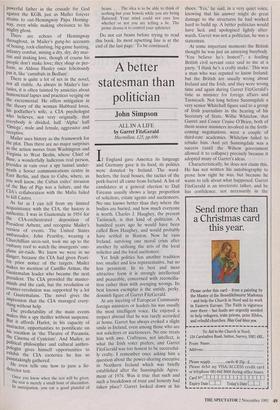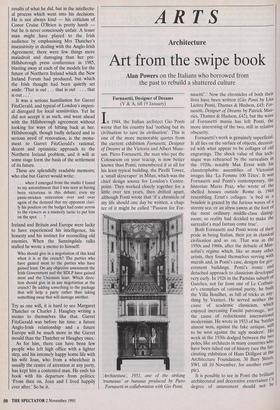A better statesman than politician
John Simpson
ALL IN A LIFE by Garret FitzGerald Macmillan, 125, pp.686 If England gave America its language and Germany gave it its food, its politics were donated by Ireland. The ward- heelers, the local bosses, the tactics of the pork-barrel all came from Ireland. A list of candidates at a general election to Dail Eireann usually shows a large proportion of solicitors, estate agents and auctioneers. No one knows better than they where the bodies are buried, and how much everyone is worth. Charles J. Haughey, the present Taoiseach, is that kind of politician. A hundred years ago he would have been called Boss Haughey, and would probably have settled in Boston. Now he runs Ireland, surviving one moral crisis after another by utilising the arts of the local solicitor and the local auctioneer.
Yet Irish politics has another tradition too: smaller and less representative, but no less persistent. In its best and most attractive form it is strongly intellectual and peaceable, concerned with reconcilia- tion rather than with avenging wrongs. Its best known exemplar is the untidy, perky, donnish figure of Garret FitzGerald. At any meeting of European Community foreign ministers or leaders his was usually the most intelligent voice. He enjoyed a respect abroad that he was rarely accorded at home. Garret has always evoked a slight smile in Ireland, even among those who are not solicitors or auctioneers. No one treats him with awe. Craftiness, not intellect, is what the Irish voter prefers, and Garret FitzGerald was too honest to be successful- ly crafty. I remember once asking him a question about the power-sharing executive in Northern Ireland which was briefly established after the Sunningdale Agree- ment of 1974. Was it true that such and such a breakdown of trust and honesty had taken place? Garret looked down at his shoes. 'Yes,' he said, in a very quiet voice, knowing that his answer might do great damage to the structures he had worked hard to build up. A better politician would have lied, and apologised lightly after- wards. Garret was not a politician, he was a statesman.
At some important moments the British thought he was just an annoying busybody. 'You believe he's honest?', a leading British civil servant once said to me at a party. 'I think he's a crafty snake.' This was a man who was reputed to know Ireland; but the British are usually wrong about Ireland and the Irish, and they were wrong time and again during Garret FitzGerald's time as minister for foreign affairs and Taoiseach. Not long before Sunningdale a very senior Whitehall figure said to a group of Irish journalists in the hearing of his Secretary of State, Willie Whitelaw, that Garret and Conor Cruise O'Brien, both of them senior ministers involved in the forth- coming negotiations, were a couple of third-rate academics. Whitelaw failed to rebuke him. And yet Sunningdale was a success (until the Wilson government allowed it to collapse) precisely because it adopted many of Garret's ideas.
Characteristically, he does not claim this. He has not written his autobiography to prove how right he was, but because he wants to talk about what happened. Garret FitzGerald is an inveterate talker, and he has confidence, not necessarily in the results of what he did, but in the intellectu- al process which went into his decisions. He is not always kind — his criticism of Conor Cruise O'Brien is pretty harsh — but he is never consciously unfair. A lesser man might have played to the Irish audience by emphasising Mrs Thatcher's insensitivity in dealing with the Anglo-Irish Agreement; there were few things more maladroit and damaging than her pre- Hillsborough press confierence in 1985, blasting away at each of the models for the future of Northern Ireland which the New Ireland Forum had produced, but which the Irish thought had been quietly set aside: 'That is out . . . that is out . . that is out ...'
It was a serious humiliation for Garret FitzGerald, and typical of London's imperi- al disregard for local sensitivities. Yet he did not accept it as such, and went ahead with the Hillsborough agreement without looking for ways of hitting back at her. Hillsborough, though badly defaced and in serious need of renovation, is the monu- ment to Garret FitzGerald's rational, decent and optimistic approach to the Northern Ireland problem, and it will at some stage form the basis of the settlement of its future.
These are splendidly readable memoirs; who else but Garret would write:
... when I emerged from the studio I found to my astonishment that I was seen as having been victorious in this debate; even my panic-stricken reiteration over and over again of the demand that my opponent clad- fy his position on the budget had come across to the viewers as a masterly tactic to put him on the spot.. . ?
Ireland and Britain and Europe were lucky to have experienced his intelligence, his honesty and his instinct for reconciling old enemies. When the Sunningdale talks stalled he wrote a memo to himself:
Who should give in a negotiation of this kind when it is at the crunch? The parties who have gained most to the parties who have gained least. On any objective assessment the Irish Government and the SDLP have gained most and the Unionists least. Which direc- tion should give in in any negotiation at the crunch? By adding something to the package that will help a party rather than taking something away that will damage another.
Try as one will, it is hard to see Margaret Thatcher or Charles J. Haughey writing a memo to themselves like that. Garret FitzGerald was before his time: a future Anglo-Irish relationship and a future Europe will be much more in the Garret mould than the Thatcher or Haughey ones.
As for him, there can have been few people who left high office with a lighter step, and his intensely happy home life with his wife Joan, who from a wheelchair is usually the centre of attention at any party, has kept him a contented man. He ends his book with his departure from politics: 'From then on, Joan and I lived happily ever after.' So be it.



































































 Previous page
Previous page